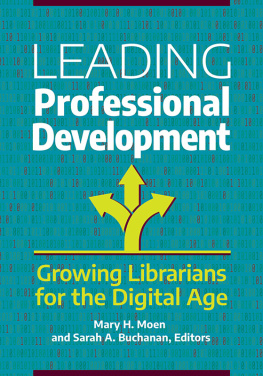Continuing Professional
Development in Social Work
LYNNE RUTTER
Series Editor: Keith Brown
Learning Matters
An imprint of SAGE Publications Ltd
1 Olivers Yard
55 City Road London EC1Y 1SP
SAGE Publications Inc.
2455 Teller Road
Thousand Oaks, California 91320
SAGE Publications India Pvt Ltd
B 1/I 1 Mohan Cooperative Industrial Area
Mathura Road
New Delhi 110 044
SAGE Publications Asia-Pacific Pte Ltd
3 Church Street
#10-04 Samsung Hub
Singapore 049483
Editor: Luke Block
Development editor: Lauren Simpson
Production controller: Chris Marke
Project management: Swales & Willis Ltd, Exeter, Devon
Marketing manager: Tamara Navaratnam
Cover design: Wendy Scott
Typeset by: Swales & Willis Ltd, Exeter, Devon
Printed by: MPG Books Group, Bodmin, Cornwall
2013 Lynne Rutter
First published 2013
Apart from any fair dealing for the purposes of research or private study, or criticism or review, as permitted under the Copyright, Design and Patents Act, 1988, this publication may be reproduced, stored or transmitted in any form, or by any means, only with the prior permission in writing of the publishers, or in the case of reprographic reproduction, in accordance with the terms of licences issued by the Copyright Licensing Agency. Enquiries concerning reproduction outside these terms should be sent to the publishers.
Library of Congress Control Number: 2012945182
British Library Cataloguing in Publication Data
A catalogue record for this book is available from the British Library
ISBN 978 1 44626 656 4
ISBN 978 1 44626 657 1 (pbk)
Contents
List of illustrations and activities
List of figures
List of tables
List of activities
Foreword
Ongoing education, learning and training are vital to both personal and workforce development and should be a collaborative venture between practitioners, employers and providers. However, there is a shift from looking at continuing professional development (CPD) as something that is foisted upon staff towards seeing it as a more proactive process dependent on individual commitment, responsibility and engagement. Recent social work CPD initiatives (e.g. the Professional Capabilities Framework) encourage practitioners to become engaged in identifying their professional learning needs and to commit to the time needed to meet them in a systematic way.
This book aims to support this process by helping social workers understand their professional development, the level and style of learning required in the workplace, and to ensure CPD activities meet individual, organisational and professional requirements. It supports the view that ongoing professional learning should be engaged with at an appropriate level (i.e. one associated with complex thinking and practices) and approached holistically so that the resulting development of professional reasoning and judgement can be appropriately recognised and evaluated. The systematic planning, recording, assessing, evaluating and/or accreditation of CPD is now an important consideration in determining the level of learning that has occurred and the impact it has had on the individual, their professional practice and the service.
This book also enhances the principles of lifelong learning and develops the use of tools such as critical thinking and reflection, enabling practitioners to plan, undertake and articulate meaningful professional development. Moreover, the content within:
- enables practitioners to take responsibility for ongoing learning and planning, undertaking and evaluating their professional development;
- links to the social work CPD framework, the Professional Capabilities Framework and Health and Care Professions Council (HCPC) re-registration requirements;
- works to Munro (2011) recommendations by acknowledging and exploring professional judgement and learning cultures.
As is always the case in this series, this text is written and designed to support the development of the best possible social work practice, in order that vulnerable citizens in society, whoever and wherever they are, can be assured of receiving a professional social work service which is valued, effective and truly makes a difference to their lives.
Professor Keith Brown
Director of the Centre for Post-Qualifying Social Work
Bournemouth University
About the author
Lynne Rutter holds academic and professional qualifications in education and has several years experience of developing and delivering Bournemouth University programmes. Her doctorate research focused on the development of professional knowledge and she is a coauthor of the Sage/Learning Matters texts Critical Thinking and Professional Judgement for Social Work and The Practice Educators Handbook. Currently she is developing continuing professional development units for post-qualifying social work.
Introduction
Social work as a profession has been experiencing a significant period of change over recent years. Work by the Social Work Reform Board (SWRB) and The College of Social Work (referred to as The College hereafter) is helping to turn recommendations made by the Social Work Task Force (SWTF, 2009) into ideas which will be of practical help on the ground, and ensure sustainable improvements to services for children, adults and families. Within this agenda is a growing appreciation of the uncertain and complex situations that social workers have to deal with. The SWRB (2010, 2011) and the Munro Review of Child Protection (Munro, 2011) have stressed the need to move towards a more creative and flexible approach to service provision in order to take account of this complexity, and for social workers to have more freedom to exercise their professional judgement.
In this environment, continuing professional development (CPD) has to acknowledge and involve the processes of professional reasoning and judgement, the complexity and uncertainty of social work practice, the relational nature of policy and procedure, as well as a range of social and political influences. This means that it goes beyond a requirement to passively update skills and knowledge; it becomes an individual responsibility to actively make sense of ongoing learning and build expertise in its widest sense. CPD is a crucial and challenging component of professional practice and also a very personal and meaningful one.
In this Introduction we will start to identify a number of features associated with CPD for social work today, the approach taken to CPD and also some fundamental concerns associated with it too. First, we will explore what the book is aiming to do.
The purpose of this book
The primary purpose of this book is to assist post-qualifying social workers in England who are undertaking CPD within the new frameworks set out by the SWRB (2011) and The College (











